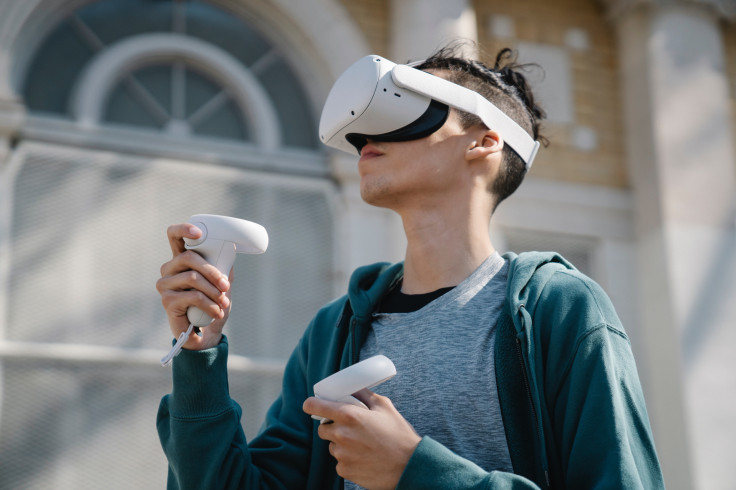Gurman says cheaper Apple Vision Pro successor in the works
Apple might have to rebrand the Vision Pro headset in China since Huawei had already registered the same trademark.

Apple is reportedly gearing up to launch a more affordable version of its recently unveiled Apple Vision Pro headset. This piece of vital information regarding the cheaper mixed reality headset has been shared by Bloomberg's Mark Gurman.
There has been a lot of hype surrounding Apple's maiden AR/VR headset. As a result, most of the headset's key features were tipped ahead of its launch. Now, the rumour mill has started churning out speculations around a pocket-friendly version of the Apple Vision Pro headset.
A more affordable version of the Apple Vision Pro headset
The word on the street is that the cheaper Apple Vision Pro headset will hit store shelves around the end of 2025. According to Gurman, the American tech giant could swap a couple of high-resolution micro-OLED displays for lower-resolution displays.
Power On: Apple, having debuted the Vision Pro headset at $3,500, is already working on a cheaper model to get the new product category onto the faces of more people. Here’s how it may do it. https://t.co/icufYacYLe
— Mark Gurman (@markgurman) June 11, 2023
Aside from this, the renowned Apple analyst suggests Apple could use an older processor to power up the more affordable Vision Pro headset. Moreover, the company could add fewer sensors and cameras in a bid to bring its asking price down. In addition to this, Gurman claims the Vision Pro successor is already in the works.
Markup on Apple Vision Pro #AppleVisionPro #visionOS #WWDC23 #SpatialComputing #AR #VR #MR pic.twitter.com/pzbuM1VSdh
— Ben Geskin (@BenGeskin) June 6, 2023
Notably, the original Apple Vision Pro isn't likely to arrive on the market anytime soon. However, Gurman revealed that the Cupertino-based tech firm is working on the second-generation Vision Pro headset in his weekly newsletter – Power On,
This comes as a surprise given that Apple's first-generation spatial computer, Vision Pro is still months away from its official market release. According to the analyst, the successor will also be a mixed-reality AR/VR headset. In other words, this purported headset will be similar to the original Vision Pro.
Apple Vision Pro: Everything we know so far
The Apple Vision Pro adopts cutting-edge innovations such as VisionOS, spatial computing, and EyeSight. It has two micro-OLED displays with 23MP (megapixels) and 12 cameras. Aside from this, it comes with six microphones and five sensors.
On the downside, the Apple Vision Pro carries a steep price tag of $3,499 (about £2.793,97). In fact, the Vision Pro is the most expensive wearable device from the company to date. Gurman says Apple realises that the Vision Pro's price point makes it out of reach for some consumers.
Apple Vision Pro supports Direct touch input across the system 🤩#AppleVisionPro #visionOS #WWDC23 #SpatialComputing #AR #VR #MR pic.twitter.com/NpmWOlTtBy
— Ben Geskin (@BenGeskin) June 6, 2023
So, Apple has started working on a more affordable version of the headset dubbed Apple One or Apple Vision, so that the masses can experience spatial computing. Much to its chagrin, Apple could also face competition from Samsung as the Korean brand is reportedly prepping to enter the AR/VR market. Understandably, Apple is trying to launch its affordable headset in 2025.
While it will be several hundred dollars cheaper than the original Apple Vision Pro, it will be interesting to see whether the rumoured Apple One will give Samsung a run for its money. Apple will reportedly replace built-in audio pods with AirPods for spatial audio. Also, the company will use cheaper materials than aluminum alloy and glass.
Apple might also replace the micro-OLED displays with lower-resolution screens. However, the tech firm isn't likely to ditch EyeSight, which shows a digital version of your blinking eyes to others. Without compromising on hand and eye tracking features, Apple could get rid of extra cameras, sensors, and the 3D camera as well.
The trademark for Vision Pro name belongs to Huawei in China
In the meantime, Apple could lock horns with Huawei over the trademark for Vision Pro in China. There's no product called Vision Pro in the US market, but Huawei registered this trademark in China four years ago. As a result, Apple might not be able to sell the Apple Vision Pro in China unless it addresses the naming issue.
Huawei’s registered trademark 4 years ago ! In other words, it is estimated that Apple will not be able to use the name "Vision Pro" in China, and Apple Vision Pro may change its name when it is launched in China. pic.twitter.com/aNq2qMF0F2
— Riceball 🍙 (@iriceball_) June 11, 2023
According to a GizmoChina report, the China Trademark Network stated that Huawei successfully registered the Vision Pro trademark back on May 16, 2019. So, it will be interesting to see whether Apple's mixed reality headset will require a name change in China.
© Copyright IBTimes 2025. All rights reserved.






















